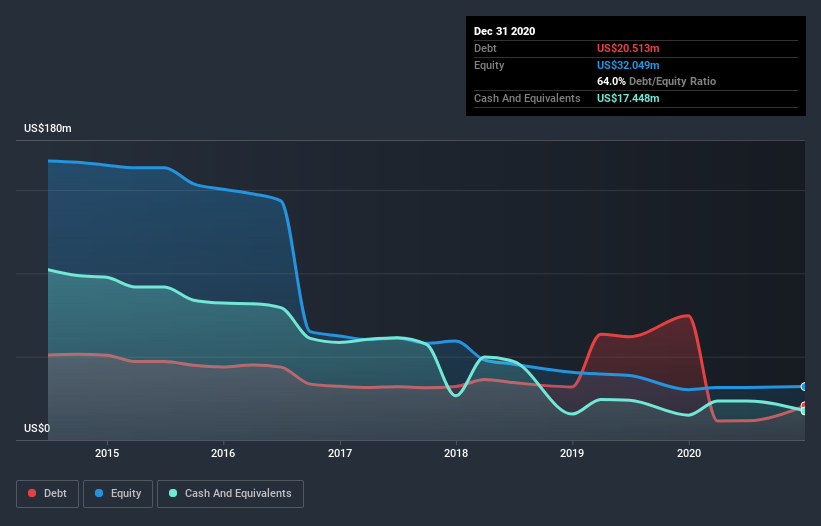David Iben put it well when he said, 'Volatility is not a risk we care about. What we care about is avoiding the permanent loss of capital.' It's only natural to consider a company's balance sheet when you examine how risky it is, since debt is often involved when a business collapses. Importantly, Newton Resources Ltd (HKG:1231) does carry debt. But should shareholders be worried about its use of debt?
When Is Debt Dangerous?
Debt assists a business until the business has trouble paying it off, either with new capital or with free cash flow. If things get really bad, the lenders can take control of the business. While that is not too common, we often do see indebted companies permanently diluting shareholders because lenders force them to raise capital at a distressed price. Of course, plenty of companies use debt to fund growth, without any negative consequences. When we examine debt levels, we first consider both cash and debt levels, together.
See our latest analysis for Newton Resources
What Is Newton Resources's Debt?
You can click the graphic below for the historical numbers, but it shows that Newton Resources had US$20.2m of debt in December 2020, down from US$74.5m, one year before. However, it does have US$17.4m in cash offsetting this, leading to net debt of about US$2.80m.

How Healthy Is Newton Resources' Balance Sheet?
The latest balance sheet data shows that Newton Resources had liabilities of US$103.5m due within a year, and liabilities of US$101.0k falling due after that. Offsetting this, it had US$17.4m in cash and US$96.5m in receivables that were due within 12 months. So it actually has US$10.3m more liquid assets than total liabilities.
This surplus suggests that Newton Resources has a conservative balance sheet, and could probably eliminate its debt without much difficulty. But either way, Newton Resources has virtually no net debt, so it's fair to say it does not have a heavy debt load!
We use two main ratios to inform us about debt levels relative to earnings. The first is net debt divided by earnings before interest, tax, depreciation, and amortization (EBITDA), while the second is how many times its earnings before interest and tax (EBIT) covers its interest expense (or its interest cover, for short). This way, we consider both the absolute quantum of the debt, as well as the interest rates paid on it.
Newton Resources has a very low debt to EBITDA ratio of 0.73 so it is strange to see weak interest coverage, with last year's EBIT being only 1.5 times the interest expense. So while we're not necessarily alarmed we think that its debt is far from trivial. Pleasingly, Newton Resources is growing its EBIT faster than former Australian PM Bob Hawke downs a yard glass, boasting a 185% gain in the last twelve months. There's no doubt that we learn most about debt from the balance sheet. But it is Newton Resources's earnings that will influence how the balance sheet holds up in the future. So when considering debt, it's definitely worth looking at the earnings trend. Click here for an interactive snapshot.
Finally, a business needs free cash flow to pay off debt; accounting profits just don't cut it. So it's worth checking how much of that EBIT is backed by free cash flow. Over the last two years, Newton Resources saw substantial negative free cash flow, in total. While that may be a result of expenditure for growth, it does make the debt far more risky.
Our View
Newton Resources's conversion of EBIT to free cash flow was a real negative on this analysis, as was its interest cover. But like a ballerina ending on a perfect pirouette, it has not trouble growing its EBIT. Considering this range of data points, we think Newton Resources is in a good position to manage its debt levels. Having said that, the load is sufficiently heavy that we would recommend any shareholders keep a close eye on it. The balance sheet is clearly the area to focus on when you are analysing debt. But ultimately, every company can contain risks that exist outside of the balance sheet. For instance, we've identified 2 warning signs for Newton Resources (1 is significant) you should be aware of.
When all is said and done, sometimes its easier to focus on companies that don't even need debt. Readers can access a list of growth stocks with zero net debt 100% free, right now.
If you’re looking to trade Newton Resources, open an account with the lowest-cost* platform trusted by professionals, Interactive Brokers. Their clients from over 200 countries and territories trade stocks, options, futures, forex, bonds and funds worldwide from a single integrated account. Promoted
Valuation is complex, but we're here to simplify it.
Discover if Newton Resources might be undervalued or overvalued with our detailed analysis, featuring fair value estimates, potential risks, dividends, insider trades, and its financial condition.
Access Free AnalysisThis article by Simply Wall St is general in nature. It does not constitute a recommendation to buy or sell any stock, and does not take account of your objectives, or your financial situation. We aim to bring you long-term focused analysis driven by fundamental data. Note that our analysis may not factor in the latest price-sensitive company announcements or qualitative material. Simply Wall St has no position in any stocks mentioned.
*Interactive Brokers Rated Lowest Cost Broker by StockBrokers.com Annual Online Review 2020
Have feedback on this article? Concerned about the content? Get in touch with us directly. Alternatively, email editorial-team (at) simplywallst.com.
About SEHK:1231
Newton Resources
An investment holding company, engages in identification and exploration of sourcing and supply of iron ores and other commodities in Mainland China and internationally.
Flawless balance sheet and fair value.
Similar Companies
Market Insights
Community Narratives




